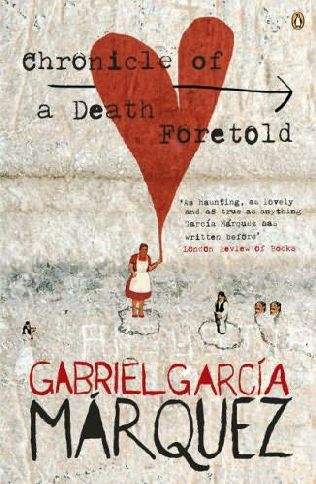 A few weeks ago I finished Chronicle of a Death Foretold by Gabriel Garcia Marquez, an author I've been wanting to read for quite some time. I did a little bit of research on him, and among other things, he is known for his very unconventional narrative styles and Chronicle was no exception. My typical favorite kind of book is one that incorporates poetic prose; one that lyrically uses language to convey the parts of life where mere words are not always enough.
A few weeks ago I finished Chronicle of a Death Foretold by Gabriel Garcia Marquez, an author I've been wanting to read for quite some time. I did a little bit of research on him, and among other things, he is known for his very unconventional narrative styles and Chronicle was no exception. My typical favorite kind of book is one that incorporates poetic prose; one that lyrically uses language to convey the parts of life where mere words are not always enough. However, this book is told in a very straightforward, (though non-linear) matter of fact way, which makes sense because the narrator is a journalist. He is trying, years later, to gather of all the facts about the murder of Santiago Nasar, What stood out to me the most is that Nasar's death really was foretold--the Vicario brothers were under the impression that he slept with his sister, the reason the sister was returned to her family after her wedding night, and were out to defend her honor. They told everyone they ran into that they were going to kill Nasar. So I have two questions:
Why were they telling this to everyone? Was it a crying out for someone to stop them, so that they can still feel they were honoring their sister, but didn't have to go through with it? Was it an intentional boldness, showing that they weren't afraid of the coming consequences? Was it a testing of the townspeople?
One of the most interesting parallels in my experience is that time and time again, students of mine tell me that they want to have consequences and boundaries in their lives. (Of course in the same breath they will tell me that they want to break them!) I have seen parents either afraid to tell their children no, or sadly, parents who do not care enough to say no, which brings me to my next question:
Why didn't the townspeople do something? Nearly the entire town had heard about this impending murder before Nasar, but only a couple of people actually tried to warn him. Did they think that it wasn't their business? That someone else would do something? Did they suffer guilt afterwards for not striving to stop this?
What scares me is how much this parallels humanity in general. What are the things that we know are happening in our neighborhoods, cities, country and world, but we look after with a vague apathy? What kind of walls have we created around ourselves that cause us to sit and watch things happen, but not step in to do something? Not that people can fight for everything, but should we all be fighting for the one thing that really moves us the most? Are we serving-and loving- the people we care the most about as we watch them make destructive decisions?
A death was foretold. Foretold. Ugh.
No comments:
Post a Comment